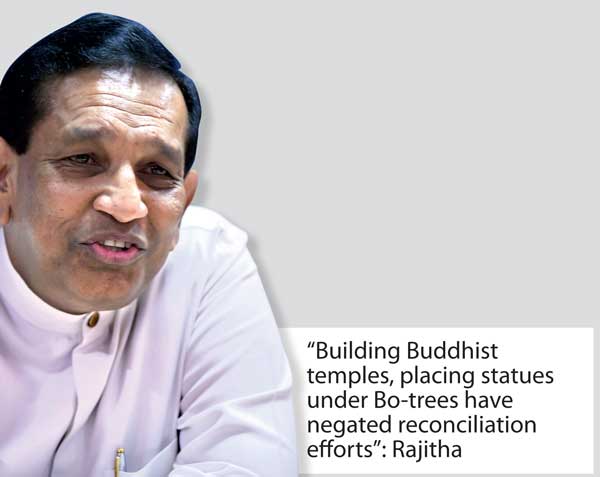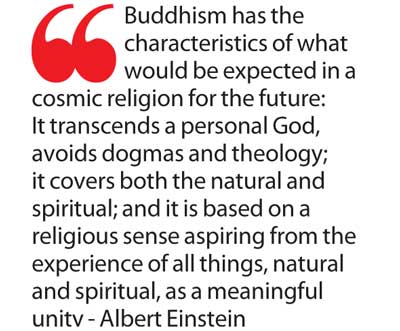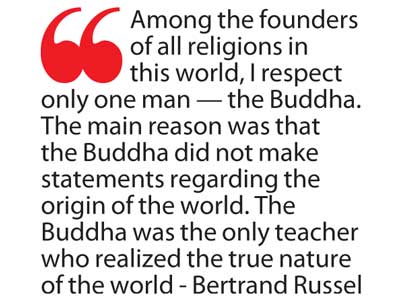Reply To:
Name - Reply Comment
Last Updated : 2024-04-25 14:54:00

“Building Buddhist temples, placing statues under Bo-trees have negated reconciliation efforts”, making a very potentially-unpopular observation, Rajitha Senaratne, Minister of Health, Nutrition and Indigenous Medicine, however, could not have uttered truer words. Hailing from a Buddhist background, educated in the two leading Buddhist schools in Sri Lanka, firstly at Nalanda College and then Ananda, Rajitha’s utterances could be politically incorrect, but they are indeed bold and beautiful.
Erecting Buddha statues at any junction, preserving Bo-trees at every corner of our widely spread-out hamlets has become an infectious habit of Sinhalese Buddhist people to show the world a misplaced sense of devotion to the religion. Behind some of these ‘religion-related’ constructions are invariably found the most destructive elements in our society -- drug dealers and traffickers, illicit liquor brewers, local hooligans and petty merchants of flesh and lust -- they all expect forgiveness and repentance by extending these superficial offerings to a mind-created Buddha, so that they could go to sleep with a self-deceived peaceful mind. These superficial offerings are in fact bribes offered to an image for clemency. Decline of Buddhism from one of Prathipatthi Pooja (practice) to Aameesa Pooja (ritualistic) has been very much in evidence in the last few decades.
To quote an unknown writer who seems to have understood the fundamental core of Buddhism writes thus: “I know that we can make great Karma by offering flowers, candles, incense, food, robes and others for the Buddha statue imagining as if the Buddha is alive. But whenever I do offer these things, my mind says ‘The Buddha is not there to receive this; and this is not the proper way to pay respect to the Buddha. The proper way is try to be mindful and be free from the defilement in the mind.’ Am I cultivating bad thoughts by thinking this way? What is the proper way to think when we offer these things to the Buddha statue?”As embroiled in inscrutable spiritual teachings and relating each and every miniscule phenomenon to a section or subsection of the Sutras in the scriptures, some of our Buddhist monks have willy nilly deflected from what is real and present. This, they do either by wilful deception (or self-deception) or due to ignorance or misreading of the Sutras.
 Whatever other differences are between Buddhism and other major religions are, apart from being a religion that rejected the notion of Aathma, one unambiguous distinction that Buddha was never ever portrayed as a ‘God’ or a relative (son or some other) of ‘God’, whereas, in all other religions, the founder or his findings are sourced to a divine spirit which they began to call ‘God’. I recall the days when, maybe in early 1960s, when I used to listen regularly to a weekly programme aired by the English National Service of Radio Ceylon, as it was known then. This programme whose title I do not recall now, was moderated by Prof. K. N. Jayatilleke and among the regular participants were Alec Robertson and Dr. E. W. Adikaram. When they discussed the concept of ‘God’, it was Dr. Adikaram who most convincingly contended that in order to understand the meaning of a concept one has to go to the root of the word. In describing the word ‘God’, Adikaram argued that the very beginning of the word, God as derived from the Sanskrit word ‘gudha’(pronounced goodha) meaning latent, inscrutable or incomprehensible. Some Sinhala scholars use this word ‘gudha’ in their daily regular Sinhala writings. When one tries to give a personality to what is indescribable, one usually ends up with the notion of a personal ‘God’.
Whatever other differences are between Buddhism and other major religions are, apart from being a religion that rejected the notion of Aathma, one unambiguous distinction that Buddha was never ever portrayed as a ‘God’ or a relative (son or some other) of ‘God’, whereas, in all other religions, the founder or his findings are sourced to a divine spirit which they began to call ‘God’. I recall the days when, maybe in early 1960s, when I used to listen regularly to a weekly programme aired by the English National Service of Radio Ceylon, as it was known then. This programme whose title I do not recall now, was moderated by Prof. K. N. Jayatilleke and among the regular participants were Alec Robertson and Dr. E. W. Adikaram. When they discussed the concept of ‘God’, it was Dr. Adikaram who most convincingly contended that in order to understand the meaning of a concept one has to go to the root of the word. In describing the word ‘God’, Adikaram argued that the very beginning of the word, God as derived from the Sanskrit word ‘gudha’(pronounced goodha) meaning latent, inscrutable or incomprehensible. Some Sinhala scholars use this word ‘gudha’ in their daily regular Sinhala writings. When one tries to give a personality to what is indescribable, one usually ends up with the notion of a personal ‘God’.
The idea behind this column, even though seemingly apolitical, not to draw attention to the contentious arguments about the existence or non-existence of a god, but to highlight a basic distinction between a rationalist such a Siddhartha Gautama Buddha, his teachings, sets of precepts and plain guidance and counsel on mundane phenomena and relating those teachings to life on an endless, regular way and those who short-sell religion in its own name for an inscrutable deity. Millions of devotees who have placed immense faith in the sublime teachings of the Buddha are not wrong; nor are they irrational; their faith and devotion is purely based on what they had been taught in  their childhood days by their parent generation. Devoid of any malice or anger, they had trodden a middle-road towards personal emancipation; their adherence to Aameesa Pooja was based more on convenience rather than on philosophical option.
their childhood days by their parent generation. Devoid of any malice or anger, they had trodden a middle-road towards personal emancipation; their adherence to Aameesa Pooja was based more on convenience rather than on philosophical option.
An old widow, Seelawathi Menike who lost her husband when her children were young and tender had to mend for herself and her family with a meagre job she did in the neighbouring coconut plantation. She did not have to go to the village thoroughfare Buddha Statue to do her daily rituals and prayers for there was no Buddha statute there, not yet. Her rituals were all conducted in her humble abode, hardly roomy enough to swing a cat.
However superficial her beliefs might have been, however misguided her spiritual emancipation was, she has done no harm to a living creature; she was not meddling with illicit liquor or drug peddling; her worldly income was hardly sufficient to feed one mouth three times a day. Intellectual curiosity is not her forte nor could she be bothered with nuanced interpretations of the Dharma. All her children gone away after marriage, Seelawathi Menike’s sole preoccupation had been religious rituals with a grand design for her next birth. To worship her Master, she did not have to travel the short distance to the Buddha statue that was erected a few years ago at the town centre by courtesy of the leading loan-shark in the area. Her Buddhism, whichever way unfounded or sullied the teachings were, in her own mind had no equal or superior to it. Her devotion was shown in the most humble and unpretentious way at her own home, in a corner which she called the shrine room which comprised of an inextinguishable oil lamp and a little Buddha statue.
The supreme Dharma the Buddha taught 2,500 years ago, has become corrupted and diluted; some self-acclaimed Buddhist monks have desecrated the sublime teachings and abused the veneration and dignity accorded to the ‘Great Followers’, the clergy of the religion; millions of devotees had clung on to the most rational and scientific explanation of the universe, how indescribable it is, that envelopes all human beings and the eternal cycle of ‘cause and effect’ that governs the circle of life on earth so profoundly and wholly. Seelawathi Menike and millions of Buddhists all over the world, who accept Buddhism more as a way of life than a religion confined within a dogged, dogmatic order, do neither harm to the religion nor any philosophical advancement of the transcendent teachings of the Dharma. Yet when unholy charlatans take over the propagation of the religion, either by coercion or by organized intimidation, it is not only the teachings that are affected adversely, the very fabric of society is threatened to be torn apart. The resulting psychological chaos that sets in the collective mind of a nation invariably tends to decline in morals, ethics and all decent parameters that normally guide and govern human development.
It is against this background, Minister Rajitha Senaratne made his utterances about Buddha statues being erected in areas where hardly any patronage is present. Taken in the context of the Northern Province and the overwhelming majority of the populace in that region being non-Buddhists, erecting Buddha Statues could be construed as being one-upmanship, an undiluted expression of triumphalism. Talking about this great religion, Bertrand Russell said “Among the founders of all religions in this world, I respect only one man — the Buddha. The main reason was that the Buddha did not make statements regarding the origin of the world. The Buddha was the only teacher who realized the true nature of the world.” And Albert Einstein is quoted as follows: “Buddhism has the characteristics of what would be expected in a cosmic religion for the future : It transcends a personal God, avoids dogmas and theology; it covers both the natural and spiritual; and it is based on a religious sense aspiring from the experience of all things, natural and spiritual, as a meaningful unity”.
It is incumbent upon every Buddhist who is considered worthy of the supreme teachings to dissociate oneself from those words and deeds of destroyers of the religion who disguise themselves as saviours. Hundreds and thousands of Seelawathi Menikes and their generation, however superficial their adherence to Buddhism is, would scorn upon them for not only debasing the great teachings of the Tathāgata Buddha, but for causing incurable wounds to a society that nourishes and nurses the very teachings.
The writer can be contacted at vishwamithra1984@gmail.com

Add comment
Comments will be edited (grammar, spelling and slang) and authorized at the discretion of Daily Mirror online. The website also has the right not to publish selected comments.
Reply To:
Name - Reply Comment
US authorities are currently reviewing the manifest of every cargo aboard MV
On March 26, a couple arriving from Thailand was arrested with 88 live animal
According to villagers from Naula-Moragolla out of 105 families 80 can afford
Is the situation in Sri Lanka so grim that locals harbour hope that they coul